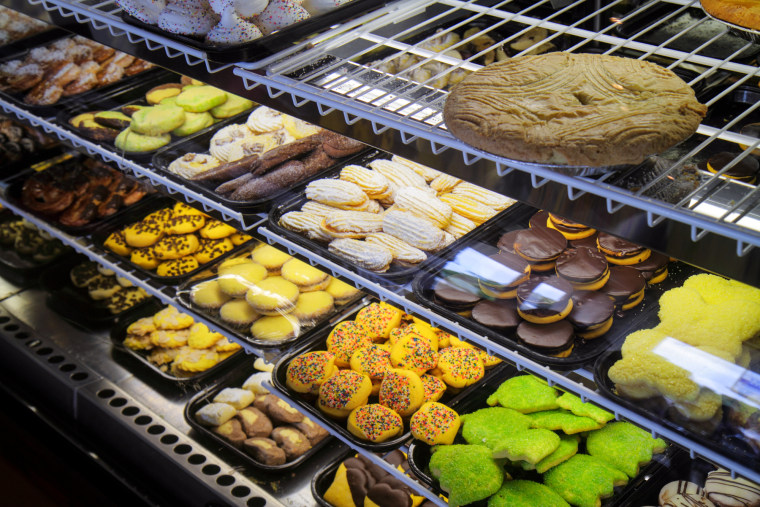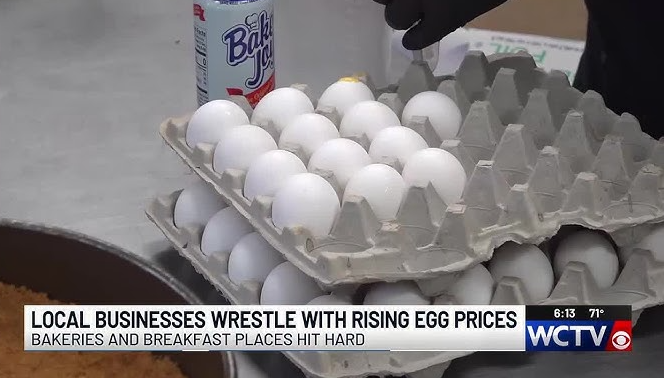Bakeries can’t beat egg prices, so your cake may cost more
Flour Bakery in Boston can’t make much with just its namesake ingredient; eggs are in just about everything from pies and cakes to brioche bread. With bird flu slamming into egg supplies and driving up prices, owner Joanne Chang said she’s charging 50 cents more for egg sandwiches and quiches — products in which eggs are among the most visible components.
“We held out for as long as we could,” she said.
Egg prices have soared amid major shortages because of avian influenza. The ongoing outbreak began in 2022 and has affected more than 162 million birds, according to the U.S. Agriculture Department, causing many farmers to cull their flocks. More than 27 million birds have been lost because of the virus so far this year alone, the American Egg Board trade group estimates.
A dozen large grade-A eggs hit an average of $4.95 in January, federal data shows, surpassing the last peak of $4.82 in January 2023. In between, prices dipped — last January, the average was just $2.52 — and businesses and consumers are now feeling whiplash.
“You see fluctuations, but you can’t adjust your prices every single time,” Chang said. She estimated paying $43 for a case — 15 dozen, or 180 eggs — as recently as December. Last week, that bill swelled to $87. She said her supplier has begun sending extra large eggs instead of large ones, which are ordinarily the most common size.
As small businesses weigh whether to raise prices to offset cost increases that threaten their profit margins, major breakfast food chains such as Waffle House have taken flak from customers who object to paying more. Many grocery stores have started rationing eggs, with Trader Joe’s limiting purchases to one dozen per customer; some Kroger and Aldi stores set that cap at two cartons per trip.
Farmers are struggling to not only meet demand, but to also keep their hens from contracting the virus, said American Egg Board President and CEO Emily Metz.
“We are in the fight of our lives,” she said. “My farmers wake up every day in fear that their farm is going to be next, and unfortunately we just haven’t been able to get any relief.”

Some hope may be on the horizon. The USDA has granted a conditional license for a vaccine for poultry, though it hasn’t been approved for commercial use yet. In the meantime, many farmers have been forced to euthanize their flocks and thoroughly sanitize their facilities in the event of an outbreak, Metz said. She estimated it could take affected farms take nine to 12 months to fully recover from an outbreak.
Normally, there’s about one egg-laying bird for every person in the U.S., or more than 330 million birds, Metz said. That tally has dropped below 280 million, she said, which is why the country is experiencing shortages.
“Eggs are indispensable,” Metz said, adding that she gets dozens of calls a day from customers asking how they can help egg farmers.
Buying organic, ironically, has become a cheaper, more affordable option for us.
Sarah Botcher, who runs Black Walnut Bakery in Minneapolis, thought she had been lucky amid skyrocketing egg prices. For months, her local organic supplier hadn’t raised prices — up until Monday evening, when he alerted her to an impending 18% bump. It’s a much smaller increase than other suppliers have instituted, said Botcher, who typically orders six cases per week.
“That’s not going to break the bank for me, and that starts in a couple weeks,” she said, adding that “buying organic, ironically, has become a cheaper, more affordable option for us.”
Farm to People, a food delivery service based in New York, has been advertising pasture-raised eggs during the outbreak, saying its $7.49 carton of a dozen has seen only a 50-cent price hike in the last seven years. The company has vowed “no price gouging on eggs” and called the nationwide shortage “yet another sign of a broken food system where large factory farms fall short.”
Eggs aren’t the only bakery staple that’s been getting more expensive. A global cocoa crunch has been sending wholesale costs sharply higher in recent weeks, and Botcher said she’s seen prices for some varieties of chocolate rising by anywhere from 35% to 50% over the past year — a period in which labor costs have surged as well.
When something goes up this drastically, this quickly, there’s not a whole lot we can do except eat the cost.
She’s a “frugal” baker, she said, and is accustomed to reducing waste and leftovers to keep costs down. Even so, she plans to raise prices for her egg and cheese sandwich by $1, and some other pastries by a quarter.
“Your margins just start to get smaller and smaller, and you just have to be very ahead of the game and continue to raise your prices,” Botcher said.
Darrin McMillen, who owns Grandview Bakery in Pittsburgh, said the cost of a 30-pound bucket of prebeaten eggs surged 345% between January 2024 and this month.
“When something goes up this drastically, this quickly, there’s not a whole lot we can do except eat the cost,” he said.
McMillen decided not to raise prices on his inflation-weary customers, but it was a tough decision.



